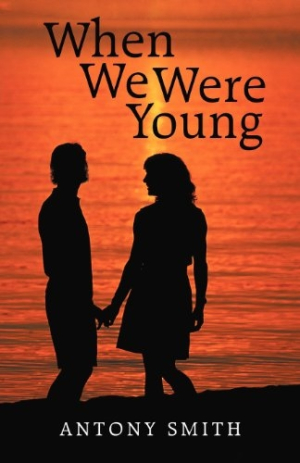When We Were Young
Presented as a family saga and historical romance, When We Were Young spans the years from WWII forward, focusing on Mitchell family member Jim and the numerous women in his life. The story follows Jim from his youth in wartime England through his career as CEO of an international hotel corporation.
First and foremost, Antony Smith deserves credit for his endurance and dedication in producing more than seven hundred pages of text for When We Were Young. However, the book is several hundred pages too long, and it’s filled with errors, repetition, and awkward scenes and phrases.
In addition to the grammatical, spelling, punctuation, and capitalization errors that plague virtually every page, there are plenty of other problems with the book, from characters who speak to themselves, usually in the past tense and the third person, to a lack of any spacing between paragraphs. At one point, for example, two characters, Jim and Lydia, are naked in bed together. “It’s time to go,” one tells the other. The very next line, with no break at all, starts with Lydia’s business partner saying, “Jim, Lydia … How nice to see you both.” Those who envision an awkward scene here will be pleased to know that the second encounter actually occurs later, and elsewhere.
The women in When We Were Young never seem to say anything; instead, they “murmur”—often. Sometimes, they “murmur softly,” and, every now and again, they “murmur seductively,” but usually, they simply “murmur.” Of course, if they are crying, which they also do a lot, they can’t always murmur, but sometimes they manage to do both, as in, “she murmured, with a tear in her eye.”
The author doesn’t do much better with his book’s sex scenes. Sex scenes can be light-hearted and humorous, but they should not be unintentionally funny. Smith writes about a woman being taken “to new heights of ecstasy” and “rousing him to further heights of sexual anticipation,” while “caressing her femininity” and “caressing the length of his manhood.” He runs into a different kind of problem, too, when he writes that, “The thoughts of the German Gestapo raping her had gone forever, replaced by fond memories of the two men who laid her beautifully”—a line beyond offensive and lacking believability.
Finally, there are several places in the text where the author completely switches tone and seems to be dictating a travel guide. The particular locations happen to be places visited by one or more of the book’s characters. “Pitcairn Island,” begins one such lesson, “is unique not because of its geography … “ The interjection is unlike anything that has come before, and, as with Smith’s lessons about the Panama Canal, Curacao, the British Virgin Islands and other locales, adds nothing of value to the story.
Antony Smith’s When We Were Young is not easy to read, with its meandering, unresolved story lines and lack of a central theme. What the book needs is direction and a ruthless editor.
Reviewed by
Cheryl M. Hibbard
Disclosure: This article is not an endorsement, but a review. The publisher of this book provided free copies of the book and paid a small fee to have their book reviewed by a professional reviewer. Foreword Reviews and Clarion Reviews make no guarantee that the publisher will receive a positive review. Foreword Magazine, Inc. is disclosing this in accordance with the Federal Trade Commission’s 16 CFR, Part 255.

